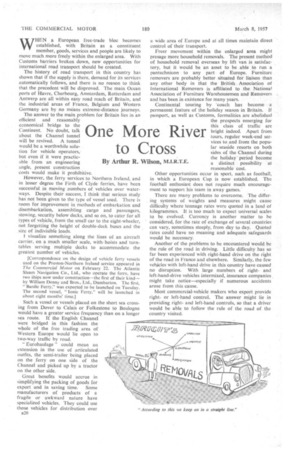ore River Cross
Page 54

If you've noticed an error in this article please click here to report it so we can fix it.
WHEN a European free-trade bloc becomes established, with Britain as a constituent member, goods, services and people are likely to move much more freely within the enlarged area. With Customs barriers broken down, new opportunities for international road transport should be created.
The history of road transport in this country has shown that if the supply is there, demand for its services automatically follows, and there is no reason to think that the precedent will be disproved. The main Ocean ports of Havre, Cherbourg, Amsterdam, Rotterdam and Antwerp are all within easy road reach of Britain, and the industrial areas of France, Belgium and Western Germany are by no means extreme-distance journeys.
The answer to the main problem for Britain lies in an efficient and reasonably economical bridge to the Continent. No doubt, talk about the Channel tunnel will be revived. A tunnel would be a worthwhile solution for vehicle operators, but even if it were practicable from an engineering By Arthur R. angle, present construction
costs would make it prohibitive.
However, the ferry services to Northern Ireland, and in lesser degree the Firth of Clyde ferries, have been successful in moving numbers of vehicles over waterways. Despite their success, I think that serious study has not been given to the type of vessel used. There is room for improvement in methods of embarkation and disembarkation, assembling cargo and passengers, stowing, security below decks, and so on, to cater for all types of vehicle, from the small car to the eight-wheeler, not forgetting the height of double-deck buses and the size of indivisible loads.
I visualize something along the lines of an aircraft carrier, on a much smaller scale, with, hoists and turntables serving multiple decks to accommodate the greatest number of vehicles.
[Correspondence on the design of vehicle ferry vessels used on the Preston-Northern Ireland service appeared in The Commercial Motor on February 22. The Atlantic Steam Navigation Co., Ltd., who operate the ferry, have two Ships now under construction—the first of their kind— by William Denny and Bros., Ltd., Dumbarton. The first, " Bardic Ferry," was expected to be launched on Tuesday. The second vessel, "tonic Ferry," will be launched in about eight months' time.]
Such a vessel or vessels placed on the short sea crossing from Dover to Calais or Folkestone to Boulogne would have a greater service frequency than on a longer sea route. If the English Channel were bridged in this fashion the whole of the free trading area of Western Euiope would lie open to two-way traffic by road.
" Eurohaulage " could mean an extension in the use of articulated outfits, the semi-trailer being placed on the ferry on one side of the Channel and picked up by a tractor on the other side.
One M to
Great benefits would accrue in simplifying the packing of goods for export and in saving time. Some manufacturers of products of a fragile or awkward nature have specialized vehicles. They could use those vehicles for distribution over 1320
a wide area of Europe and at all times maintain direct control of their transport.
Freer movement within the enlarged area might presage more household removals. The present method of household removal overseas by lift van is satisfactory, but it would be an asset to be able to run a pantechnicon to any part of Europe. Furniture removers are probably better situated for liaison than any other body in that the British Association of International Removers is affiliated to the National Association of Furniture Warehousemen and Removers and has been in existence for many years.
Continental touring by 'coach has become a permanent feature of the holiday season in Britain. If passport, as well as Customs, formalities are abolished the prospects emerging for this class of traffic arc bright indeed. Apart from tours, regular week-end services to and from the popular seaside resorts on both sides of the Channel during the holiday period become
Wilson, M.1.R.T.E. a distinct possibility at
reasonable cost.
Other opportunities occur in sport, such as football, in which a European Cup is now established. The football enthusiast does not require much encouragement to support his team in away games.'
There are many problems to overcome. The differing systems of weights and measures might cause difficulty where tonnage rates were quoted in a land of kilogrammes. It is too much to expect universal scales to be evolved. Currency is another matter to be considered, for the rate of exchange of several countries can vary, sometimes steeply, from day to day. Quoted rates could have no meaning and adequate safeguards would be necessary.
Another of the problems to be encountered would be the rule of the road in driving. Little difficulty has so far been experienced with right-hand drive on the right of the road in France and elsewhere. Similarly, the few vehicles with left-hand drive in this country have caused no disruption. With large numbers of rightand left-hand-drive vehicles intermixed, insurance companies might take notice—especially if numerous accidents arose from this cause.
Most commercial-vehicle makers who export provide rightor left-hand control. The answer might lie in providing rightand left-hand controls, so that a driver would be able to follow the rule of the road of the country visited.




































































































